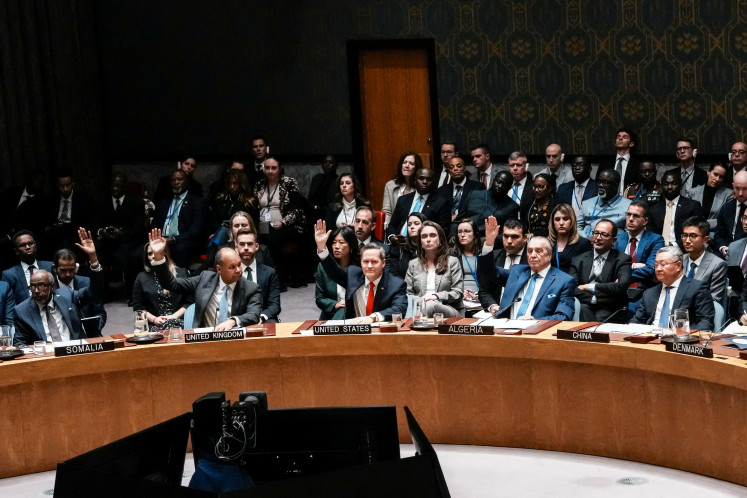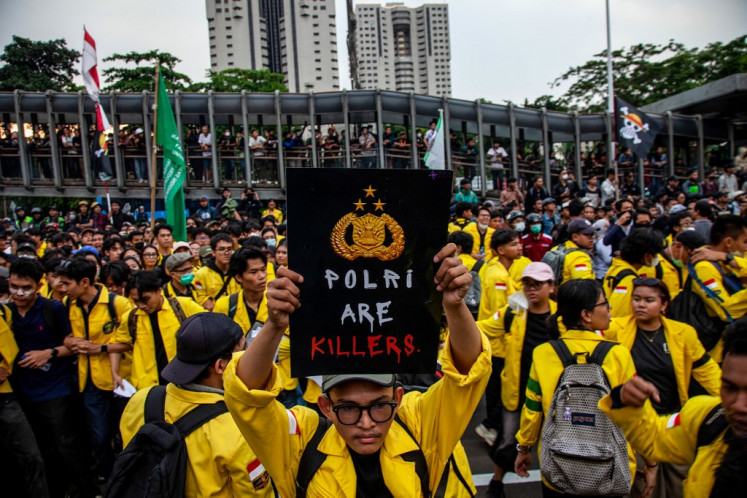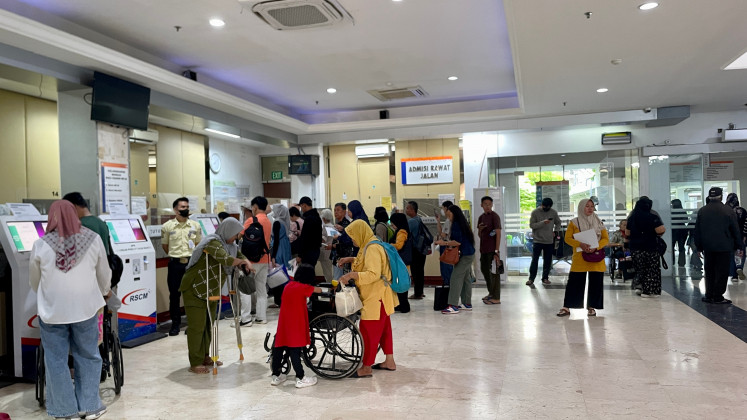Popular Reads
Top Results
Can't find what you're looking for?
View all search resultsPopular Reads
Top Results
Can't find what you're looking for?
View all search resultsWhy a nonmilitaristic approach needed to solve Papua conflict
The string of shooting incidents only adds to a series of violence besetting the provinces of Papua and West Papua.
Change text size
Gift Premium Articles
to Anyone
S
hooting incidents were rife again in Papua during the past month. In the afternoon of April 25, the head of the Papua office of the State Intelligence Agency (BIN) was shot from a close distance in Beoga district in the highland regency of Puncak, indicating that the shooter had weaponry skills and a territorial understanding of the site.
Only days later, a crossfire in Ilaga regency cost the lives of a Mobile Brigade (Brimob) police officer and a suspected member of the Free Papua Organization (OPM).
Prior to the two incidents, civilians and ordinary, nonpartisan citizens, including teachers, fell victim to conflicts between security forces and armed groups.
The string of shooting incidents only adds to a series of violence besetting the provinces of Papua and West Papua. Academics have consistently dubbed the warlike situation on Papuan land the most protracted self-determination movement in Indonesia's history when compared to the Aceh conflict (1976-2005) and East Timor (1975-1999) (Heidbuchel, 2007: 157; Bhakti, Yanuarti & Nurhasim, 2009: 17-18; Wassel, 2014: 2-5).
As usual, security troops have been deployed to hunt down perpetrators of the shooting incidents. The fight against the Papuan armed rebels has taken a new twist as the government declared them terrorist groups.
The persistent use of a militaristic approach has left a question about the fate of nonarmed civilians who have always been caught in the middle of the conflict. These civilians include Papuan people and migrants who arrived in Papua to make a living. Do they have the right to express their desire for a peaceful life and freedom from fear?
More importantly, how do we interpret the existence of the continuous armed conflict in a territory known for its richness in natural resources?
The conflict in Papua is very complex and cannot be approached from one point of view. Indonesia, in this case, is not alone. Post-decolonization problems have also occurred in several other countries, such as Myanmar and Sri Lanka, where armed conflicts continue to be part of daily life, even though in some of these countries electoral democracy is instilled and people's participation in a variety of governance and social, cultural and economic activities is guaranteed.
I believe in a nonmilitaristic approach as the most appropriate option amid continuing tensions between warring parties in Papua for at least three pressing reasons.
First, the fourth amendment of the Constitution clearly states Indonesia's global participation in creating peace. That includes peace on our home turf. By mainstreaming militaristic options in handling armed conflicts anywhere in the country, we risk spreading prolonged hatred among the community toward the government, especially the security apparatus. President Joko “Jokowi” Widodo himself has opted for a development approach in Papua.
Second, as a transitioning democracy since May 1998, Indonesia does not lack human resources and minds to propose an alternative approach in terms of locality-based peacebuilding, which includes identifying the root causes of conflicts and possible inclusive solutions. We may recall a dialogue was proposed by a team consisting of academics, religious leaders and local activists, male and female, led by two founders of Papua Peace Network (Jaringan Damai Papua), namely the late Father Neles Tebay and Muridan S Widjojo.
The concept was built based on years of rigorous action-oriented study by the Indonesian Institute of Sciences (LIPI), which performed a thorough mapping of four conflict roots, identified various local actors, positions and interests and published the results in the "Papua Road Map" (2008). The study addressed the conditions for peacebuilding by inclusively recognizing local agencies' roles through a "Papua Peace Network".
That network hosted several local workshops to develop indicators of the "Papua Land of Peace ". "Dialogue" is then no longer an isolated word when discussing Papua. President Susilo Bambang Yudhoyono called it "constructive communication", while President Jokowi mentioned "dialogue" several times aside from the "prosperity approach".
Likewise, a white paper on Papuan dialogue in addition to the vocabulary of "dialogue" itself was conveyed directly (and discussed with various parties) or indirectly during President Jokowi’s era.
However, due to the excessive glorification of the militaristic approach to eradicating the OPM, proposals for genuine dialogue have never received an adequate portion in the discussion among policymakers. As a result, as it is, policymakers and legislators are "trapped" and tend to repeat the predominant security approach alongside the development approach. Policymakers urgently need to hear the voices of local people.
Third, a comprehensive nonmilitaristic approach is necessary to reduce the possibility of future resentment among the younger generation in Papua. A study by Adriana Elisabeth et al., "Updating Papua Roadmap", analyzed the complex dynamics of network and issues among Papuan students in Indonesia and abroad.
We must not undermine the impact of Papuan student protests in several cities triggered by the racist exclamation incident. Instead of confronting their expressions, policymakers are strongly advised to contextualize the dialogue approach's protests. If we recall, the post-1998 democracy movement was started by students from campuses.
The same features are seen today where Papua students could critically assess what is taking place in their respective hometowns. Instead of putting aside their opinions, policymakers ought to listen and appreciate their voices.
The late founder of the Papua Peace Network, Muridan S Widjojo, once said, "dialogue will not kill anyone". It is high time to continue to advocate this method: proposing a nonmilitaristic resolution of armed conflicts that mainstream approaches to prevent victims of "collateral damage" among civilians; preventing the cycle of revenge among the nation's future generation; breaking the long chain of violence.
Advancing thoughts and actions with this perspective does not mean we lack patriotism or are against the Unitary State of the Republic of Indonesia. In fact, in a democratic country with a long history of conflict like Indonesia, there needs to be more room to provide alternatives to such thoughts. Emerging policies must not depend on the use of force, like manhunts, arrests or shootings.
***
The writer is a PhD candidate at the Gender, Peace and Security Centre of Monash University.










